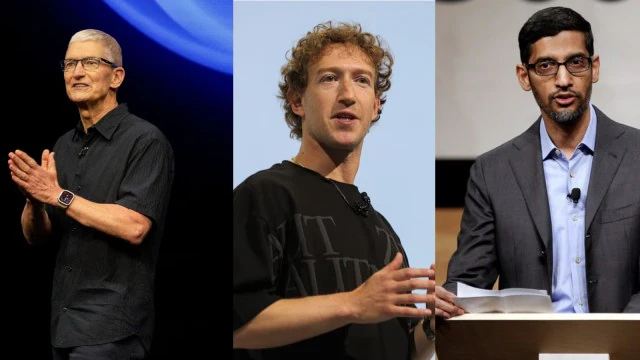
In the world of technology, things change fast. What is popular today can be old news tomorrow. In 2025, even the biggest tech companies like Apple, Google, and Meta (Facebook) are feeling the pressure. These companies once ruled the digital world. But now, they face serious competition, new technology trends, and changing user behavior. Many experts believe that time may be running out for their most successful products like the iPhone, Google Search, and Facebook.
The iPhone Is Losing Its Magic
Apple launched the first iPhone in 2007. It changed the world. The iPhone became more than a phone – it became a lifestyle. Millions of people waited for every new version. But today, things are different.In 2025, the iPhone is still a strong product, but it’s not exciting like before. New versions look the same, and the updates are small. People are not upgrading their phones every year like they used to. Many are keeping their iPhones for 3-5 years.At the same time, competition from Android brands like Samsung, Xiaomi, and OnePlus is growing. These phones offer similar features at lower prices. In India, Africa, and Southeast Asia, Android is winning the market.Another big threat is the rise of AI-powered devices. Smart glasses, voice assistants, and wearable tech are starting to take over tasks we used to do on phones. Companies like OpenAI, Humane, and Meta are creating new devices that don’t need a screen. This could be a huge problem for Apple, which depends on iPhone sales for most of its profits.
Google Search Is No Longer the Only Option
Google Search has been the king of the internet for over 20 years. It helped people find information quickly and made Google one of the richest companies in the world. But now, AI tools and changing habits are putting pressure on Google’s crown.In 2023 and 2024, tools like ChatGPT, Perplexity AI, and You.com became popular. People started using them to ask questions, write essays, or find information – without going to Google. These AI assistants give direct answers instead of showing a list of links.Younger users, especially Gen Z, prefer to search for products and news on TikTok, Instagram, or even Reddit. This change in search behavior means less traffic for Google, and that’s bad news for their ad revenue.
Also, with AI tools getting smarter, people are skipping ads and clicking fewer links. Google is trying to fight back with AI Overviews and its own chatbot called Gemini, but many say it’s not as helpful as the newer AI tools.If Google loses its search dominance, it could lose its main source of income. This is why experts say that Google needs a serious makeover to survive the next five years.
Facebook Is Losing Young Users
Facebook, once the most used social media platform, is now struggling to stay relevant. While Meta still owns big platforms like Instagram and WhatsApp, the Facebook app itself is slowly dying — especially among young people.Today’s teenagers prefer TikTok, Snapchat, and YouTube Shorts. These platforms offer short, fun videos and personalized content. Facebook, with its long posts and crowded interface, feels old-fashioned.Even worse, Facebook has a reputation for being full of misinformation, political arguments, and ads. Many users say it’s no longer fun. The number of daily active users in the US and Europe is falling.To stay in the game, Meta is betting big on the metaverse and virtual reality. But so far, the response has been slow. Devices like the Meta Quest 3 are interesting, but they are still too expensive and not widely used.Unless Facebook changes its strategy, it might become a platform mostly used by older generations. That’s not a good sign for a tech company that wants to lead the future.
The Rise of AI and New Players
One major reason why Apple, Google, and Facebook are under pressure is the fast growth of artificial intelligence. In the past, these companies were leaders in innovation. But now, startups and new companies are moving faster.OpenAI’s ChatGPT, Microsoft’s Copilot, and Anthropic’s Claude are showing what the future looks like. They are offering smart, AI-based tools that help with writing, research, coding, and even daily decision-making.These tools don’t depend on apps or ads. Instead, they use natural conversation, which makes them easy and fun to use. This new way of interacting with technology could replace search engines, social media feeds, and even traditional smartphones.In this AI world, speed and usefulness matter more than brand names. If the tech giants don’t adapt, they risk falling behind quickly.
User Behavior Is Changing Fast
In the past, people used a few apps every day – Google to search, Facebook to connect, and iPhone to do it all. But now, users want custom experiences, privacy, and speed.People are spending more time on short-form video apps, podcasts, and messaging platforms. They are using AI tools to complete tasks and get answers instantly.Also, users are more aware of privacy issues. They don’t want companies to track them all the time or show them ads based on their data. Apple has added new privacy features, but Facebook and Google still rely heavily on ads – which need user data.This growing demand for transparency, trust, and useful content is changing how companies must operate.
The Race for the Future of Tech
The next 5 years will be critical for the tech industry. The old rulebook no longer works. Tech giants must find new ways to stay important in people’s lives.Apple needs to move beyond the iPhone. It must create new devices, like AR glasses or AI-first platforms, that are just as useful and popular.Google needs to protect its search business and explore new models of AI-driven information. It must also make Gemini and other tools smarter, faster, and more trustworthy.Facebook must find a way to attract younger users again. That could mean rethinking what Facebook is and creating new, engaging experiences for the next generation.
The tech world is changing faster than ever. iPhones, Google Search, and Facebook were once seen as unbeatable. But now, they must prove they still matter in an AI-driven, privacy-conscious, fast-moving world.If they don’t innovate, listen to users, and adapt, time may truly run out for them. The future of Silicon Valley depends not on size, but on speed, creativity, and vision.































